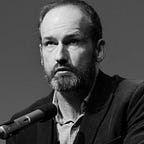Neither doctors nor the courts but nature determined the fate of Charlie Gard
Tragic beyond tragic is the story of Charlie Gard and his parents’ heartrending battle to try and reverse the irreversible when it came to his fate. The sight of them rent with grief outside the High Court as they acknowledged that they had finally accepted the inevitable is one that nobody who watched it will soon forget.
As everyone who has been following this story is aware, Charlie Gard was born with a rare genetic degenerative disorder known as mitochondrial depletion, causing progressive muscle weakness and brain damage.
Though his parents, as mentioned, waged an epic struggle to be allowed to access experimental treatment for him in America, the medical staff at London’s Great Ormond Street Hospital, one of the leading children’s hospitals in the world, opposed their efforts on the basis that in their opinion the treatment in question would not work and was not in Charlie’s best interests.
On its website the hospital avers that “There is no cure for Charlie’s condition which is terminal. GOSH explored various treatment options, including nucleoside therapy, the experimental treatment that one hospital in the US has agreed to offer now that the parents have the funds to cover the cost of such treatment. GOSH concluded that the experimental treatment, which is not designed to be curative, would not improve Charlie’s quality of life.”
Dr Michio Hirano is the US doctor who testified in the High Court in April that the experimental treatment, Nuceleoside Bypass Therapy, could help improve Charlie’s condition. However Hirano, a neurology professor at Columbia University in New York, gave his testimony without having seen or having examined the child beforehand, basing his opinion on nothing more solid than laboratory tests and the case histories of other patients with a related but different condition.
At the subsequent High Court hearing on July 24, Dr Hirano came in for harsh criticism from Great Ormond Street over his failure to examine the child’s medical notes or scans prior to his intervention in the case, and also for his alleged financial interest in some of the drugs involved in the experimental treatment he was advocating. It was at this hearing that Hirano, having examined Charlie’s scans, testified that in his opinion there was no hope, prompting the child’s parents to finally concede that both their and their 11 month old child’s fight was over.
Though much is being made of the months that were spent in an unseemly legal battle between Charlie Gard’s parents and Great Ormond Street Hospital, it is hard to gainsay the harsh reality is that from the outset the hope they had latched onto that their son could be treated in the US and survive was false hope. Though absolutely no fault devolves to the parents, over the few weeks in which the case was at the top of the news, a terminally ill baby was transformed into a moral football; his plight and case exploited by a who’s who of religious zealots, ‘pro-life’ demagogues, and conspiracy theorists, confirming that in 2017 the struggle between reason and unreason has not yet been won.
Those who assert that the medical staff at Great Ormond Street conspired with the state to kill this poor child are the enemies of reason. While the sacred bond between a parent and child is preternatural, in a society whose juridicial system is underpinned by the rights of the individual, children do not belong to their parents. Children, including babies, have rights that are distinct and independent from that of their parents, with the state in the last analysis the arbiter of what is in the best interests of said child. It is well that it is so, else children would be at the complete mercy of their parents, no matter how bad or cruel or abusive.
Charlie Gard’s parents were undoubtedly motivated by profound love for their child. Watching them struggle with every fibre of hope to keep him alive leaves no doubt of it. But, ultimately, they were prisoners of false hope, lapsing into the erroneous belief that the clinicians at Great Ormond Stret did not have their child’s best interests at heart. The truth is they did have his best interests at heart, as did the courts, which despite the barrage of unfounded verbiage bandied around by assorted wingnuts, refused to be cowed and acted as we would expect them to in such a grave matter.
As for Charlie, may he rest in peace.
